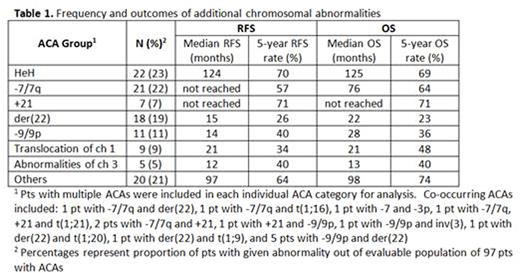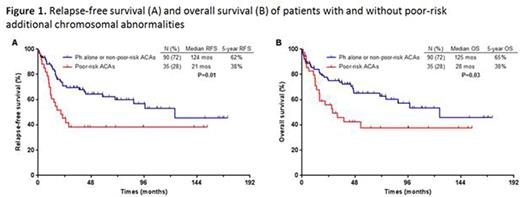Abstract
Background: Prior to the introduction of tyrosine kinase inhibitors (TKIs), additional chromosomal abnormalities (ACAs) in patients (pts) with Philadelphia chromosome-positive (Ph+) acute lymphoblastic leukemia (ALL) were associated with worse outcomes. However, in pts treated with chemotherapy plus a TKI regimen, the prognostic impact of ACAs is not well-established.
Methods: Between 6/2001 and 1/2016, we identified 152 adult pts with newly diagnosed Ph+ ALL treated at our institution on 3 protocols with hyper-CVAD plus a TKI. 27 pts were positive for BCR-ABL1 by FISH and/or PCR but did not have a Ph chromosome identified on baseline karyotype and therefore were excluded from the analysis. In the remaining evaluable population of 125 pts with a Ph+ karyotype, complete molecular response (CMR) after 3 months of therapy, relapse-free survival (RFS) and overall survival (OS) were compared among pts with and without ACAs.
Results: The median age of the evaluable population was 55 years (range, 23-85 years). All pts received hyper-CVAD plus imatinib (n=34, 27%), dasatinib (n=51, 41%) or ponatinib (n=40, 32%). Of the 125 evaluable pts in whom the Ph chromosome was detected, 28 (22%) had Ph alone and 97 (78%) had Ph plus one or more ACAs. Among the 97 pts with ACAs, 22 (23%) were high hyperdiploid (HeH; defined as 51-65 chromosomes); no pts with low hypodiploidy (defined as 30-39 chromosomes) were identified. Excluding ACAs associated with chromosomal gain in the 22 pts with HeH, the recurrent ACAs identified in >5% of the ACA population were: -7/7q in 21 pts (22%), der(22) in 18 pts (19%), -9/9p in 11 pts (11%), translocations of chromosome 1 in 9 pts (9%), +21 in 7 pts (7%), and abnormalities of chromosome 3 in 5 pts (5%).
The median duration of follow-up for the evaluable population was 51 months (range, 4-173 months). The 5-year RFS and OS rates were similar between the Ph alone and ACA groups (RFS: 56% and 57%, respectively, P=0.57; OS: 54% and 58%, respectively, P=0.78). However, when individual ACA groups were compared, distinct prognostic groups were identified (Table 1). Pts with der(22), -9/9p, translocations of chromosome 1, or abnormalities of chromosome 3 (n=35, 36% of the ACA cohort and 28% of the evaluable population) had a particularly poor prognosis with a median RFS of 15 months, 14 months, 21 months and 12 months, respectively. These 4 ACAs constituted a poor-risk ACA group with a median RFS of 21 months and 5-year RFS rate of 38%. In contrast, pts with ACAs other than der(22), -9/9p, translocations of chromosome 1, or abnormalities of chromosome 3 (n=62, 64% of the ACA cohort) had a median RFS of 124 months and a 5-year RFS rate of 65%. These pts with non-poor-risk ACAs had similar RFS to those with Ph alone (P=0.82).
The 3-month CMR rate for the pooled group of pts with Ph alone or non-poor-risk ACAs compared to the group of poor-risk ACA pts was 63% vs. 50% (P=0.29). Pts with poor-risk ACAs had significantly shorter RFS (median 21 months vs. 124 months and 5-year RFS rate 38% vs. 62%, P=0.02; Figure 1A) and OS (median 28 months vs. 125 months and 5-year OS rate 38% vs. 65%, P=0.03; Figure 1B). The rate of allogeneic stem cell transplant was similar between the Ph alone / non-poor-risk ACA group and the poor-risk ACA group (23% vs. 17%, respectively; P=0.45). Compared to pts with only 1 poor-risk ACA (n=27), pts with 2 poor-risk ACAs (n=8) had significantly shorter RFS and OS (P=0.004 and P=0.02, respectively).
By univariate analysis including age, WBC count, platelets, BM blasts, performance status, CD20 expression, presence of CNS leukemia, BCR-ABL1 transcript type, TKI received, and ACA risk group, the factors associated with RFS were poor-risk ACAs (P=0.02) and TKI (P=0.04); the factors associated with OS were poor-risk ACAs (P=0.03), age (P=0.03) and TKI (P=0.02). By multivariate analysis, only poor-risk ACAs were associated with worse RFS (HR 1.88 [95% CI 1.07-3.30], P=0.03). In contrast, the factors independently associated with OS were age (HR 1.02 [95% CI 1.00-1.04], P=0.04) and TKI (HR 0.59 [0.39-0.89], P=0.02) but not poor-risk ACAs (HR 1.48 [95% CI 1.06-3.24], P=0.19).
Conclusions: In pts with Ph+ ALL receiving chemotherapy plus a TKI, der(22), -9/9p, translocations of chromosome 1, or abnormalities of chromosome 3 constitute a group of poor-risk ACAs that confers inferior RFS and OS. These poor-risk ACAs should be taken into account when planning post-remission strategies in pts with Ph+ ALL.
Jabbour:ARIAD: Consultancy, Research Funding; Pfizer: Consultancy, Research Funding; Novartis: Research Funding; BMS: Consultancy. Cortes:ARIAD: Consultancy, Research Funding; BMS: Consultancy, Research Funding; Novartis: Consultancy, Research Funding; Pfizer: Consultancy, Research Funding; Teva: Research Funding. O'Brien:Pharmacyclics, LLC, an AbbVie Company: Consultancy, Honoraria, Research Funding; Janssen: Consultancy, Honoraria. Daver:Ariad: Research Funding; Pfizer: Consultancy, Research Funding; Karyopharm: Honoraria, Research Funding; Sunesis: Consultancy, Research Funding; Kiromic: Research Funding; BMS: Research Funding; Otsuka: Consultancy, Honoraria. Jain:Pharmacyclics: Consultancy, Honoraria, Research Funding; Seattle Genetics: Research Funding; Abbvie: Research Funding; Celgene: Research Funding; Incyte: Research Funding; Infinity: Research Funding; Genentech: Research Funding; Pfizer: Consultancy, Honoraria, Research Funding; Servier: Consultancy, Honoraria; Novartis: Consultancy, Honoraria; BMS: Research Funding; Novimmune: Consultancy, Honoraria; ADC Therapeutics: Consultancy, Honoraria, Research Funding. Konopleva:Cellectis: Research Funding; Calithera: Research Funding.
Author notes
Asterisk with author names denotes non-ASH members.



This feature is available to Subscribers Only
Sign In or Create an Account Close Modal